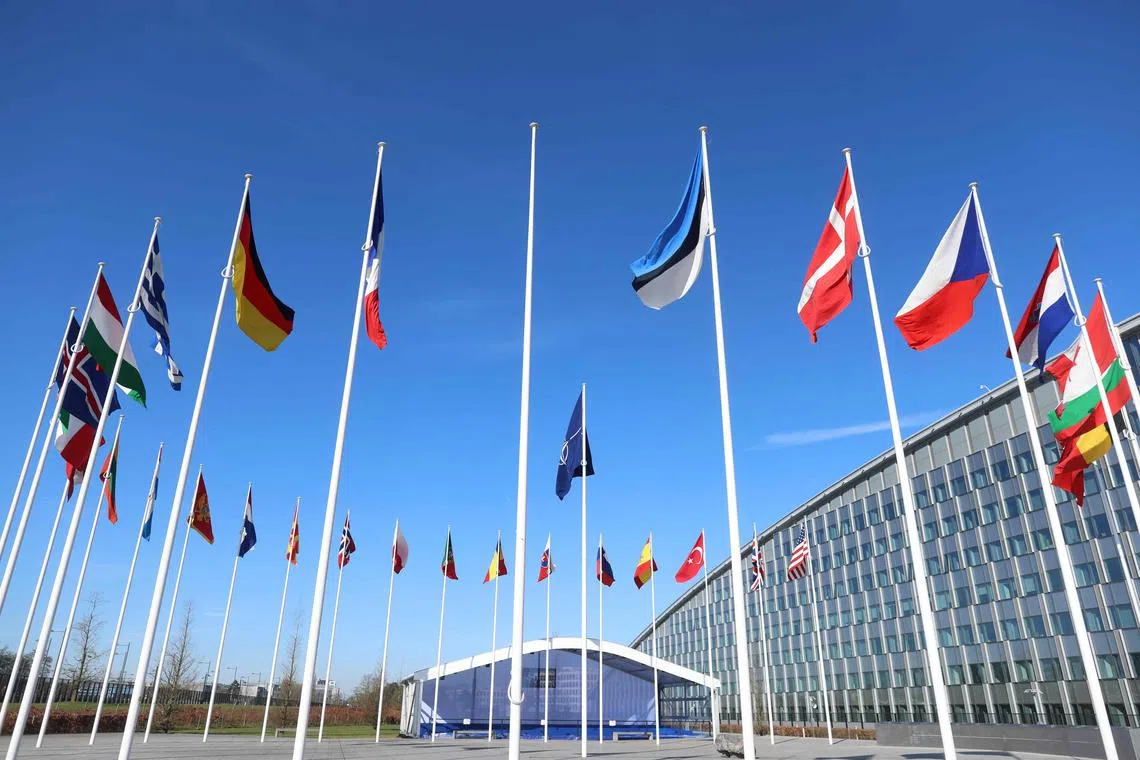Nato gains massive artillery arsenal as Finland becomes its 31st member
Sign up now: Get ST's newsletters delivered to your inbox

Finland's blue-and-white flag will soon be flying next to those of its Nato allies in Brussels.
PHOTO: AFP
BRUSSELS – Finland became the 31st member of Nato on Tuesday, in a historic strategic shift provoked by Moscow’s war on Ukraine,
Finland’s Foreign Minister Pekka Haavisto handed Finland’s accession document to US Secretary of State Antony Blinken in Brussels, marking its formal entry into the alliance’s fold.
“We can now declare that Finland is the 31st member of the North Atlantic Treaty,” Mr Blinken said.
US President Joe Biden said he is “proud” to welcome Finland into Nato.
“Together – strengthened by our newest ally Finland – we will continue to preserve transatlantic security, defend every inch of Nato territory,” Mr Biden said in a statement.
Nato Secretary-General Jens Stoltenberg said: “Finland becomes safer by belonging to an alliance where we guarantee the security of all allies. By becoming a full-fledged member, we are removing the room for miscalculation in Moscow about Nato’s readiness to protect Finland and that makes Finland safer and Nato stronger.”
Finnish President Saul Niinisto said Finland’s most significant contribution to Nato’s common deterrence and defence would be to defend its own territory. There is still significant work to be done to coordinate this with Nato, he said.
“It is a great day for Finland, and I want to say that it is an important day for Nato,” Mr Niinisto said at a joint news conference with Mr Stoltenberg.
In 2022, the Kremlin’s all-out invasion of Ukraine upended Europe’s security landscape and prompted Finland – and its neighbour Sweden – to drop decades of military non-alignment.
Awkward allies Turkey and Hungary, for different reasons of their own, delayed Finland’s bid to come under the Nato umbrella – and Stockholm’s progress remains blocked.
But last week, the Turkish Parliament voted to clear Finland’s final hurdle.
Completing the ratification in well under a year still makes this the fastest membership process in the alliance’s recent history.
Putin gets more Nato
Finnish Defence Minister Antti Kaikkonen called it “a big day for Finland, of course, and I’d say it’s a win-win situation”.
“Our next goal is, of course, to get our good neighbour Sweden to the full membership as well,” he said.
Joining Nato places Finland under the alliance’s Article Five, the collective defence pledge that an attack on one member “shall be considered an attack against them all”.
This was the guarantee Finnish leaders decided they needed as they watched Russian President Vladimir Putin’s devastating assault lay waste to swathes of Ukraine.
“President Putin had, as a declared goal of the invasion of Ukraine, to get less Nato,” Mr Stoltenberg said.
“He wanted less Nato along his borders. He wanted to close Nato’s door. No more Nato membership for any more countries in Europe. He’s getting exactly the opposite.”
Invaded by its giant neighbour, the Soviet Union, in 1939, Finland – which has a 1,300km border with Russia – stayed out of Nato throughout the Cold War.
Now, its membership brings a potent military into the alliance, with a wartime strength of 280,000 and one of Europe’s largest artillery arsenals.
And its strategic location bolsters Nato’s defences on a border running from the vulnerable Baltic states to the increasingly competitive Arctic.
Nato was created as a counterweight to the Soviet Union at the outset of the Cold War era that began immediately after the Allies defeated Nazi Germany.
Sweden soon?
The bloc has gone through waves of expansion that brought it ever closer to Russia’s borders.
Nato’s reach into eastern and southern European countries that were once under Moscow’s effective control infuriated the Kremlin and strained its relations with Washington.
At first, the Kremlin appeared to play down the significance of the alliance’s border advancing to touch a new stretch of Russia’s north-western frontier.
But it said on Monday that it would boost its military presence in the region in response to Finland joining Nato.
The Kremlin branded Finland’s Nato membership an “assault on our security”.
Kremlin spokesman Dmitry Peskov told reporters that Russia “believes that this is the latest aggravation of the situation”.
“The expansion of Nato is an assault on our security and Russia’s national interests,” he said.
“And this forces us to take countermeasures... in tactical and strategic terms.”
Defence Minister Sergei Shoigu said the move raised the prospect of the conflict in Ukraine escalating further.
British Prime Minister Rishi Sunak on Tuesday hailed Finland’s “historic” accession to Nato and urged the military grouping to admit Sweden next.
“All Nato members now need to take the steps necessary to admit Sweden too, so we can stand together as one alliance to defend freedom in Europe and across the world,” he said.
Finland’s arrival remains a bittersweet moment for the alliance, as the hope has been for Sweden to come on board at the same time.
Budapest and Ankara remain the holdouts on Sweden’s accession after belatedly agreeing to wave through Helsinki’s bid.
Sweden has upset Hungary leader Viktor Orban – one of Mr Putin’s closest allies in Europe – by expressing alarm over the rule of law in Hungary.
It has also angered Turkey by refusing to extradite dozens of suspects that President Recep Tayyip Erdogan links to a failed 2016 coup attempt and a decades-long Kurdish independence struggle.
Nato diplomats hope Mr Erdogan will become more amenable if he weathers elections in May, and that Sweden will join before a Nato summit in Vilnius this July.
“Sweden is ready to join the Nato alliance,” tweeted Mr Blinken. AFP, REUTERS


